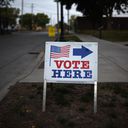Amid racial unrest, a test at the polls

Published Date: 6/2/2020
Source: axios.com
Eight states plus D.C. are holding primary elections today following a week of intense protests across the country over the brutal police killing of George Floyd.Why it matters: It's the first major test for voting since the national outcry. Concerns over civil unrest and the police — as well as the coronavirus and expanded absentee voting — could reduce the number of voters showing up in person but heighten tensions for those who do.The big picture: Primaries are taking place in D.C., Indiana, Iowa, Maryland, Montana, New Mexico, Pennsylvania, Rhode Island and South Dakota. Protests over Floyd's killing have taken place in all of those states and in the nation's capital. Some have turned violent, including in D.C., Albuquerque, Sioux Falls and Philadelphia. Between the lines: An increased presence of law enforcement at polling centers or surrounding areas could intimidate voters or incite unrest. Curfews could also hinder turnout. Suzanne Almeida, the Pennsylvania director of voting rights group Common Cause, told Axios they have been hearing that some poll workers in Philadelphia might not show up because of the past week's events. "This is not a criticism of workers who are choosing not to go to the polls tomorrow, but it is going to make things more complicated."Protesters will still have to adhere to state electioneering laws that prohibit certain political activities near polling places, National Association of Secretaries of State spokesperson Maria Benson told Axios. "Due to COVID-19 many states have increased voting by mail and/or absentee voting, which will mean less in-person polling place voting activity," she added.What to watch: Baltimore's elections office was forced to close early Monday due to concerns about protests, the Baltimore Sun reported. Pennsylvania prohibits police from being within 100 feet of polling places (except to vote), but the increased police and National Guard presence in some cities could intimidate voters, Almeida said. State officials are closely tracking protests and disturbances.Despite heated protests, Sioux Falls will not have a police presence at voting centers at this point, Mayor Paul TenHaken told Axios. "We expect everything to run smoothly, but are prepared to respond accordingly if necessary."Voting centers in D.C. were not expected to have a police presence, Board of Elections spokesperson Rachel Coll told Axios. But there was a significantly heavier armed presence on the city's streets Monday night.